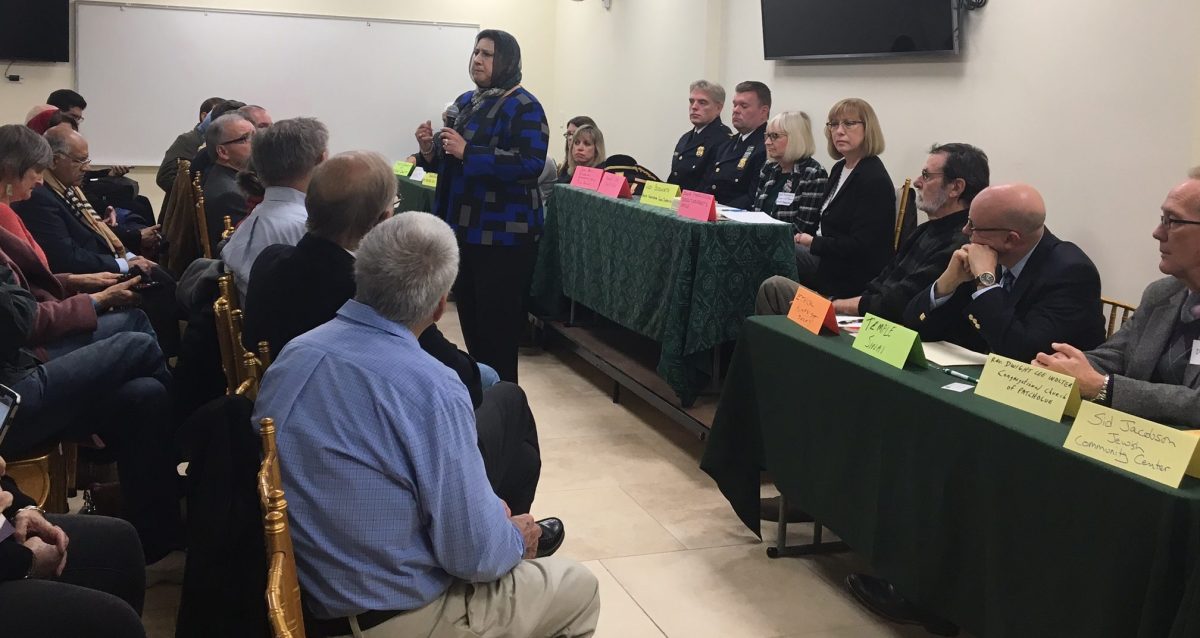Should my daughter remove her hijab? Should I tell my son to shave his beard? What do I tell my young children when they ask if President-elect Donald Trump is going to deport us?
Those were just some of the pointed questions posed to a panel of religious leaders, elected officials, law enforcement and community organizers during an often-emotional forum that attracted close to 100 people at the Islamic Center of Long Island (ICLI) in Westbury on Thursday night.
Muslim and Jewish leaders in Nassau County following Trump’s shocking victory last month coordinated the hastily arranged event. It sparked passionate discussion about tangible steps minority groups should take when confronted by hate-filled rhetoric and what role law enforcement can play in preventing bias crimes. Nationwide last year, anti-Muslim hate crimes saw a dramatic 67-percent increase from the prior year, and attacks on Jews, blacks and LGBT people also spiked.
The number of incidents this year won’t be available until 2017, but anti-hate groups have documented hundreds of bias crimes since the Nov. 8 election.
The event, the first of many to come, was in response to accusations that candidate Trump trafficked in hate, misogyny and Islamophobia to drudge up support from people distrustful or fearful of immigrants. Underscoring the anxiety many minority groups are feeling, Silvia Finkelstein of the Nassau District Attorney’s Office of Immigrant Affairs said she’s been to about a dozen similar events in the last three weeks.
At one point, a visibly perturbed Rabbi Michael White of Temple Sinai of Roslyn peered over at elected officials and questioned how they’d react if Trump’s incoming administration institutes a registration system for Muslims.
“We’ve been protected by a phenomenal police department, and I don’t expect that to change,” White, a panelist, said. “There has been a spike all over the country of horrific events in schools and in parks, phrases like ‘Heil Trump,’ swastikas, awful stuff…You raised the issue of this abominable potential of a registry…I want to know from our elected officials here: if the federal government calls for a registry based on religion, what will you do?”
RELATED: Trump Team Considering Resurrecting Ineffective & Discredited Bush-Era Muslim Registry
Town of North Hempstead Supervisor Judi Bosworth, the daughter of Holocaust survivors, demurred. Instead she said the key is to be proactive and to continue holding similar events that unite the community.
“I grew up understanding the danger of identifying groups, of having groups feel that they were in any kind of danger of who they were, how they prayed,” she said. “And so our best approach is what we’re doing here tonight—it’s by standing together.”
Bosworth noted that after the election, a swastika was discovered in the bathroom of a Port Washington public school. The community responded by organizing a similar forum that attracted more than 500 people.
ICLI President Dr. Isma Chaudhry set the tone for the evening’s discussion when she recalled the palpable fear among mosque leaders for their congregation, particularly weekend school students and teachers. Chaudhry, who has made a career out of interfaith dialogue, said even she was unable to effectively respond to entreaties from worried parents.
“Parents are asking me, should they ask their girls to take their head covers off when they go out?” she recalled. “Do the young Muslim men now have to shave off their beard because their parents are afraid?”
RELATED: ‘Heil Hitler’: Reports of Hate Crimes Have Long Island, Nation on Edge
John Berry Jr., commander of Nassau County police’s Third Precinct, which covers Westbury, said practicing Muslims should not diverge from their faith.
“You have our support—we are behind you 100-percent,” he told Chaudhry and the audience, many of whom were Muslim. “There’s no reason to change. This is what America is about; it’s a melting pot. In particular, New York and New York City [have] always been that way. I wouldn’t change any of your practices or customs—do what you’ve always done.”
When confronted by a young Muslim woman about discredited claims of Sharia law spreading in the US and questionable police tactics—most notably the NYPD’s years-long surveillance of Muslims on Long Island and elsewhere after the Sept. 11, 2001 attacks—Deputy Chief of Patrol Kenneth Lack said cops, like religious groups, are frequently over-generalized as he defended his department.
“I think we do it better than most of those 18,000 other police departments,” he said of NCPD’s decades-old policy of community engagement, adding that each officer in the police academy participates in 12-hour hatred and intolerance training at the Holocaust Memorial and Tolerance Center of Nassau County.
While it was difficult for panelists and community members to agree to a consensus as to how best to address many of their fears among Long Islanders, their was near-unanimous agreement that schools must take a more prominent role in educating students about tolerance.
Jenna Freed of Roslyn, a parishioner at Temple Sinai and the parent of an adopted child from Ethiopia, said it’s important that parents air concerns to school officials.
“When the election happened I reached out to our school district…and said what are you gonna do?” she said. “Because if my kids come home and feel targeted, they’re going to be really devastated and I’m going to be really mad…your words will carry much more weight when you proactively send something out and address it then they will reacting to a crime.”
She said within minutes after her meeting, the principal of one of the schools sent a letter to all parents calling the school a “place of unity and community and we celebrate our diversity.” Similarly, an elementary school in the district tried to alleviate fears by reminding parents about the “No Place for Hate” initiative its involved in to address intolerance and hate.
Another parent of four echoed Freed’s sentiment.
“Fear spreads from ignorance,” the woman said. “They know nothing about Islam, they know what they hear in the media.
“I think we need to bring more speakers into our schools,” she continued, adding that a middle school-aged girl in her district in Suffolk County was harassed and threatened suicide. “This is how dangerous it is.”
A woman who identified herself as a longtime educator at Westbury Public Schools, said its no secret that some kids are fearful of new deportation policies.
“Since the election, nobody in the school district has really addressed the elephant in the room,” she told the panelists. “We hear our children in the hallway [talk] fearfully about whether or not their parents are going to be sent away—we’re not supposed to answer because we’re not supposed to be politically correct. And that more than disturbs me because, I too, was raised in a family of Holocaust survivors and I was taught the danger of silence.”
Despite the trepidation among many parents, some speakers offered hopeful messages.
Dr. Faroque Khan, a board member of the ICLI, reminded the audience about how support for the Muslim American community on Long Island has grown since 9/11.
“We have to be optimistic, this will pass,” Khan said. “We did not elect a new constitution, we elected a new president. That’s a crucial difference.”





























